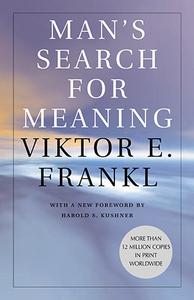Take a photo of a barcode or cover
informative
inspiring
reflective
medium-paced
challenging
dark
informative
inspiring
reflective
slow-paced
For such a famously inspiring book, I didn’t connect with this as much as I wanted to. The first half was gripping and profound (although told with some detachment); the second half felt like a long ad for the author’s specific brand of therapy. Lots of quotes and phrases were repeated verbatim throughout the various sections and postscripts, which felt unnecessary.
challenging
dark
emotional
informative
inspiring
reflective
medium-paced
dark
inspiring
reflective
medium-paced
emotional
informative
inspiring
fast-paced
challenging
dark
emotional
informative
reflective
sad
tense
medium-paced
Victor Frankel utilises his own experience, as well as others’ he witnessed, to explore the psychological stages of surviving Nazi concentration camps during WWII. Frankel’s 3 horrific years in multiple camps, and the constant struggle to find reasons to endure, aided in the development of “logotherapy”, which suggests that the primary motivation for living is to find meaning.
One important part of his theory was the idea that no matter what happens to a person, they retain the freedom to react and respond the way they want. I found that Frankel’s response to his traumatic time at the camps (choosing to remain hopeful and later forgiving and working alongside those who might have contributed to his fate) extremely impressive. I can see why people say this book is life changing.
The second half of the book focused solely on logotherapy, and while it was apparently abridged, still lost me a tad at times…
One important part of his theory was the idea that no matter what happens to a person, they retain the freedom to react and respond the way they want. I found that Frankel’s response to his traumatic time at the camps (choosing to remain hopeful and later forgiving and working alongside those who might have contributed to his fate) extremely impressive. I can see why people say this book is life changing.
The second half of the book focused solely on logotherapy, and while it was apparently abridged, still lost me a tad at times…
reflective
sad
medium-paced
I am awarding stars for the first half of the book, which I found compelling and I was very interested in the stories of how the author survived the Holocaust. However, he basically uses the first half of the book to promote "logo-therapy". It gets extremely repetitive and none of it stuck with me. I reccomend the first half of the book, but the second half could have been simplified.
The most important lesson in this book is best expressed by the quote of Friedrich Nietzsche, "He who has a why to live can bear almost any how"
Even after living in inhumane conditions in the concentration camp and suffering beyond anything we can even imagine, he managed to find meaning and hope which made the suffering bearable. "Suffering ceases to be suffering at the moment it finds a meaning"
He told in this book that everything can be taken from a man but the freedom to choose how he responds. As long as he has a purpose and he's choosing to respond positively, he can take whatever that's thrown at him.
This is an amazing read that showed me the resolve and strength of human will and inspired me to look for the 'why' in my life for which I can bear any 'how'
Even after living in inhumane conditions in the concentration camp and suffering beyond anything we can even imagine, he managed to find meaning and hope which made the suffering bearable. "Suffering ceases to be suffering at the moment it finds a meaning"
He told in this book that everything can be taken from a man but the freedom to choose how he responds. As long as he has a purpose and he's choosing to respond positively, he can take whatever that's thrown at him.
This is an amazing read that showed me the resolve and strength of human will and inspired me to look for the 'why' in my life for which I can bear any 'how'
emotional
hopeful
informative
inspiring
reflective
sad
medium-paced




